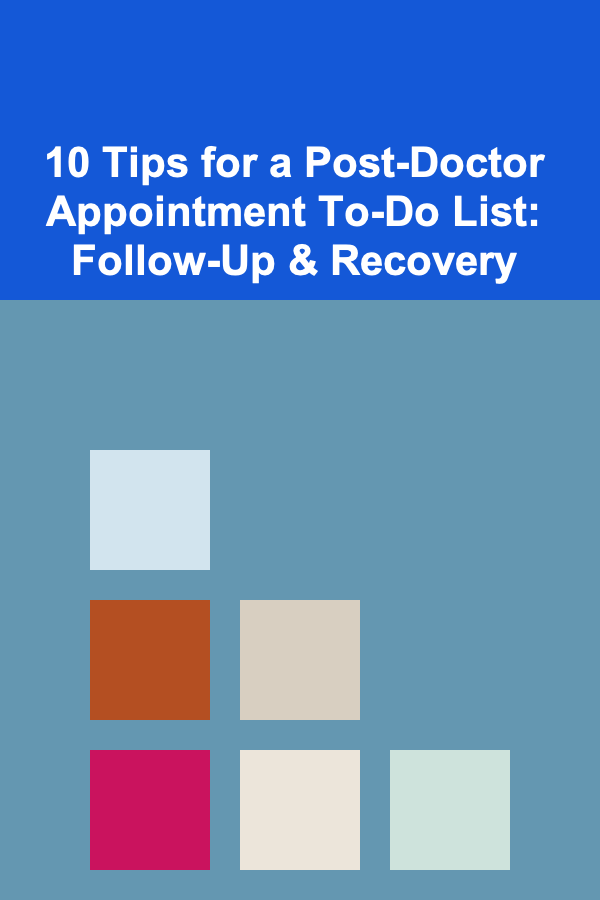
10 Tips for a Post-Doctor Appointment To-Do List: Follow-Up & Recovery
ebook include PDF & Audio bundle (Micro Guide)
$12.99$5.99
Limited Time Offer! Order within the next:

A doctor's appointment is often the first step in a journey toward better health, but it doesn't end when you leave the office. Many people overlook the crucial follow-up actions necessary to ensure recovery and monitor their progress. A post-doctor appointment to-do list is essential for managing your health after a visit to your healthcare provider, ensuring that you fully understand the next steps, and helping to avoid complications in the recovery process.
Whether you've received a new diagnosis, been prescribed medication, or have undergone a medical procedure, organizing and managing follow-up tasks is key to ensuring that your health is properly addressed. The post-appointment period is the time to implement any instructions given by your doctor, monitor symptoms, and maintain communication with your healthcare provider if needed. Here's a comprehensive guide to what should be included in your post-doctor appointment to-do list.
Review Doctor's Instructions Carefully
One of the first steps after a doctor's appointment is to ensure that you fully understand all the instructions given by your healthcare provider. This includes medication schedules, lifestyle changes, and specific activities or exercises. Here are some things to keep in mind:
- Medications: Make sure you understand how and when to take prescribed medications. If the doctor prescribed a new medication, ask if it should be taken with food, at certain times of the day, or if there are any potential side effects.
- Diet and Activity Restrictions: Some treatments or procedures may require you to make changes to your diet or avoid specific activities for a period of time. Ensure that you are clear on these guidelines.
- Follow-up Procedures: If your doctor recommended follow-up tests, scans, or procedures, mark them down and schedule them promptly to avoid delays in your treatment.
Tip: If you're unsure about any aspect of the instructions, don't hesitate to contact your doctor's office for clarification. It's better to ask than to risk doing something incorrectly.
Organize and Schedule Follow-Up Appointments
After a doctor's visit, it's often necessary to schedule follow-up appointments or additional tests. Whether it's a routine check-up, a specialist visit, or a follow-up for ongoing treatment, keeping track of these appointments ensures that you stay on track with your recovery plan.
- Set Dates: Try to schedule appointments as soon as possible to secure convenient times.
- Confirm the Details: Write down the exact date, time, location, and purpose of the follow-up visit. Also, confirm if there are any special instructions for these appointments, such as fasting before a blood test or bringing documents.
- Reminder System: Use your phone or a calendar to set reminders a few days in advance to ensure you don't forget these important dates.
Tip: Many doctor's offices offer online scheduling and reminders, so take advantage of these tools to streamline your post-appointment process.
Keep Track of Symptoms and Changes
Whether you are recovering from a procedure, managing a new diagnosis, or taking new medications, it is essential to keep a close eye on your symptoms. Your doctor may have provided guidance on what to expect during the recovery process, but monitoring any unexpected changes or new symptoms is just as important.
- Write Down Symptoms: Keep a journal or use an app to record daily symptoms. This includes pain levels, fatigue, any side effects from medications, or changes in appetite.
- Monitor Progress: Track how you're feeling and note improvements or regressions. This can help you detect early warning signs of complications.
- Report Any Issues: If you experience unusual symptoms, such as severe pain, fever, or unexpected side effects, notify your doctor immediately. Keeping your healthcare provider informed helps them adjust your treatment plan if necessary.
Tip: Make a habit of documenting your symptoms after each doctor's visit. This provides useful data for your healthcare provider during future consultations.
Follow Up on Test Results
If your doctor ordered tests (such as blood work, imaging, or biopsies) during the appointment, be proactive in following up on the results. Many tests have results that are available after a few days, but it's essential to take the necessary steps to review them.
- Ask for Results: Before leaving the appointment, clarify how and when you can expect to receive the results of any tests.
- Contact the Office: If you haven't heard back by the expected time, contact your doctor's office to inquire about the results. Make sure you understand the next steps based on the findings.
- Request a Copy: Always request a copy of your results for your records. This can help you track changes in your health over time and ensure that no important information is overlooked.
Tip: If you have any concerns or questions about your results, don't hesitate to call your healthcare provider for an explanation.
Manage Medications and Refills
After receiving prescriptions, it's important to manage your medications properly to avoid running out and ensure consistent treatment. You may also need to adjust your current medications, especially if they're related to a chronic condition or new health concern.
- Get the Prescription: If the doctor prescribed new medications, ensure that you leave the appointment with the prescription or a note explaining how to fill it.
- Check for Interactions: Make sure you inform your doctor about any other medications you are taking to avoid potential interactions.
- Set Up Refills: If you've been prescribed long-term medications, make sure that you can easily refill them as needed. Set reminders for when it's time to order a refill.
- Track Doses: It's essential to follow the dosage schedule precisely to avoid complications. Use a pill organizer or a medication tracking app to keep track.
Tip: Keep a list of all your medications and dosages in your wallet or on your phone to share with any healthcare provider who treats you.
Adhere to Recovery Instructions
For those undergoing surgery, medical procedures, or significant treatments, following specific recovery instructions is crucial to avoid complications and promote healing. These instructions may include guidelines on mobility, wound care, and self-care practices.
- Rest and Limit Activity: Many recovery plans require you to take it easy and avoid strenuous activities. Be sure to schedule rest and relaxation time, and avoid pushing yourself too hard.
- Wound Care: If you've had surgery or any invasive procedure, proper care of the wound is vital. Follow the instructions for cleaning, dressing, and monitoring the wound for signs of infection.
- Physical Therapy or Exercises: If your doctor prescribed physical therapy or at-home exercises, make sure to follow through. These activities often help speed up recovery and prevent future complications.
Tip: Create a checklist for each day of your recovery, including rest, wound care, and exercises, to keep you on track.
Evaluate Mental and Emotional Health
Recovery isn't just physical---your mental and emotional well-being also plays a major role in your overall health. It's not uncommon to experience feelings of anxiety, depression, or frustration during or after medical treatments, especially if the recovery process is long or challenging.
- Monitor Your Mental Health: Pay attention to how you're feeling emotionally. Feelings of sadness, hopelessness, or anxiety should be addressed with the help of your healthcare provider.
- Consider Support: If you find yourself struggling emotionally, reach out to a therapist, counselor, or support group. Talking with someone who understands can help reduce stress and improve recovery.
- Mindfulness and Stress Relief: Practices like meditation, yoga, or simply taking time to relax can support both your mental and physical recovery.
Tip: Take breaks when needed, and don't feel guilty about prioritizing your emotional health. Recovery takes time, and your mental state matters just as much as your physical health.
Stay Hydrated and Eat Nutritious Foods
Good nutrition and hydration are essential components of recovery. Your doctor may provide specific guidelines for your diet, but in general, following a well-balanced, nutritious eating plan can speed up the healing process.
- Hydration: Drink plenty of fluids, especially if you've had surgery or an illness that leads to dehydration.
- Balanced Diet: Eat nutrient-rich foods to support immune function and tissue repair. This includes fruits, vegetables, whole grains, lean proteins, and healthy fats.
- Avoid Certain Foods: Some treatments, such as antibiotics or certain surgeries, may require you to avoid specific foods (like dairy or alcohol). Make sure you follow these guidelines carefully.
Tip: Plan your meals ahead of time to ensure that you're consuming the nutrients you need for a smooth recovery.
Establish Communication with Your Doctor's Office
Ongoing communication with your doctor is vital to track your recovery, adjust treatment plans, and address any concerns. After your appointment, stay in touch with your healthcare provider to update them on your progress or ask questions.
- Keep in Touch: If something feels off, or if you're unsure about how to manage a symptom, don't hesitate to reach out.
- Use Patient Portals: Many doctor's offices have online portals where you can message your provider, check test results, and schedule appointments. Take advantage of these tools for ease of communication.
- Emergency Situations: If something urgent comes up (such as worsening pain or unexpected symptoms), contact your doctor or visit an urgent care center.
Tip: Maintain a list of questions or concerns to discuss during follow-up visits to make the most of your appointment.
Track Long-Term Health Goals
If your doctor has recommended lifestyle changes or long-term treatments, tracking your progress over time is essential. These goals might include weight management, physical therapy, stress reduction, or controlling chronic conditions such as diabetes or hypertension.
- Set Realistic Goals: Work with your doctor to set achievable milestones, and track your progress regularly.
- Celebrate Small Wins: Every improvement, no matter how small, is a step toward better health. Celebrate your progress to stay motivated.
- Stay Committed: Recovery may take time, and setbacks can happen. Stay consistent with your health plan, and don't be discouraged by temporary challenges.
Tip: Keep a health journal to document your progress and any adjustments you need to make.
Conclusion
Taking the time to create and follow a comprehensive post-doctor appointment to-do list is essential for optimizing your recovery and ensuring long-term health. By reviewing your doctor's instructions carefully, scheduling follow-up appointments, tracking symptoms, managing medications, and supporting your physical and emotional well-being, you are putting yourself on the path to success. Recovery is not a one-time event---it's a continuous process that requires attention and care. By staying organized and proactive, you will be better equipped to handle your health and make a full recovery.
Reading More From Our Other Websites
- [Organization Tip 101] How to Install Peel and Stick Backsplash Tiles for a Quick Update
- [Home Space Saving 101] How to Use Dividers to Maximize Drawer Space
- [Personal Investment 101] How to Build Passive Income by Creating Deep Learning Courses
- [Home Holiday Decoration 101] How to Add Playful Holiday Decor to Your Home
- [Toy Making Tip 101] Engineering Play: Advanced Toy-Making Challenges for Adults and Young Inventors
- [Biking 101] Top 5 Bike Suspensions for a Smooth and Comfortable Ride
- [Home Space Saving 101] How to Create Extra Storage Space Under the Stairs
- [Personal Investment 101] How to Build and Maintain The Importance of an Emergency Fund to Weather Financial Storms
- [Gardening 101] How to Choose the Perfect Materials for a Durable Garden Walkway
- [Organization Tip 101] How to Share Stories and Wisdom Through Oral Histories

10 Fun Money-Saving Challenges to Help You Reach Your Financial Goals
Read More
How to Budget for Home Organization and Decluttering Projects
Read More
How to Create a Budget That Works for Your Lifestyle
Read More
How to Make Your Home Feel Like a Ski Lodge with Cozy Decor
Read More
Choosing the Right Jumper Cables for Emergency Starts
Read More
10 Tips for Scaling Scrum in a Large Organization
Read MoreOther Products

10 Fun Money-Saving Challenges to Help You Reach Your Financial Goals
Read More
How to Budget for Home Organization and Decluttering Projects
Read More
How to Create a Budget That Works for Your Lifestyle
Read More
How to Make Your Home Feel Like a Ski Lodge with Cozy Decor
Read More
Choosing the Right Jumper Cables for Emergency Starts
Read More